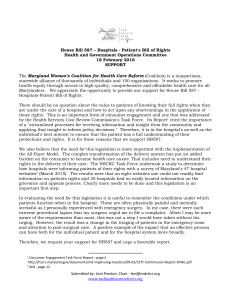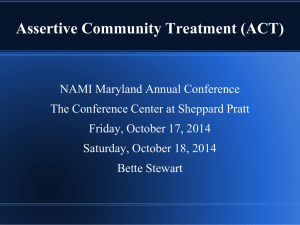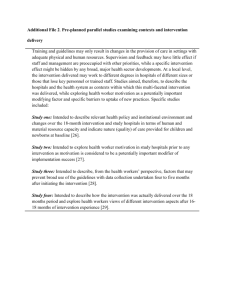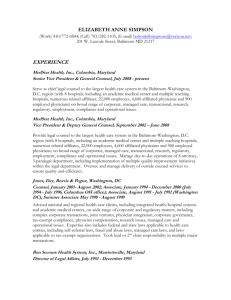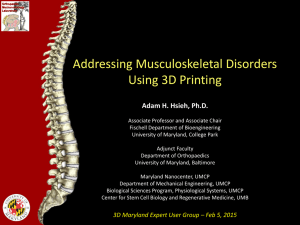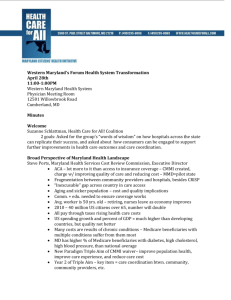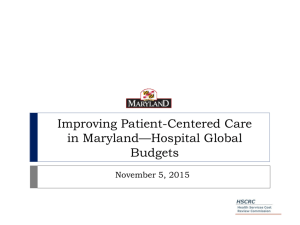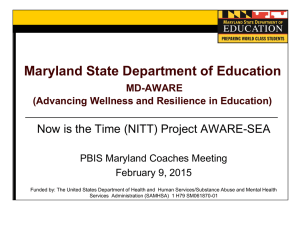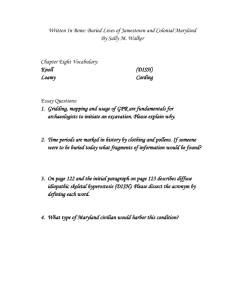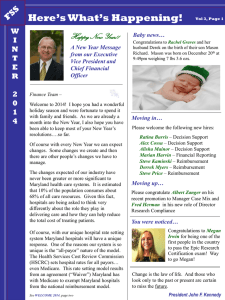Consumer Protections for Patients of Maryland Hospitals
advertisement
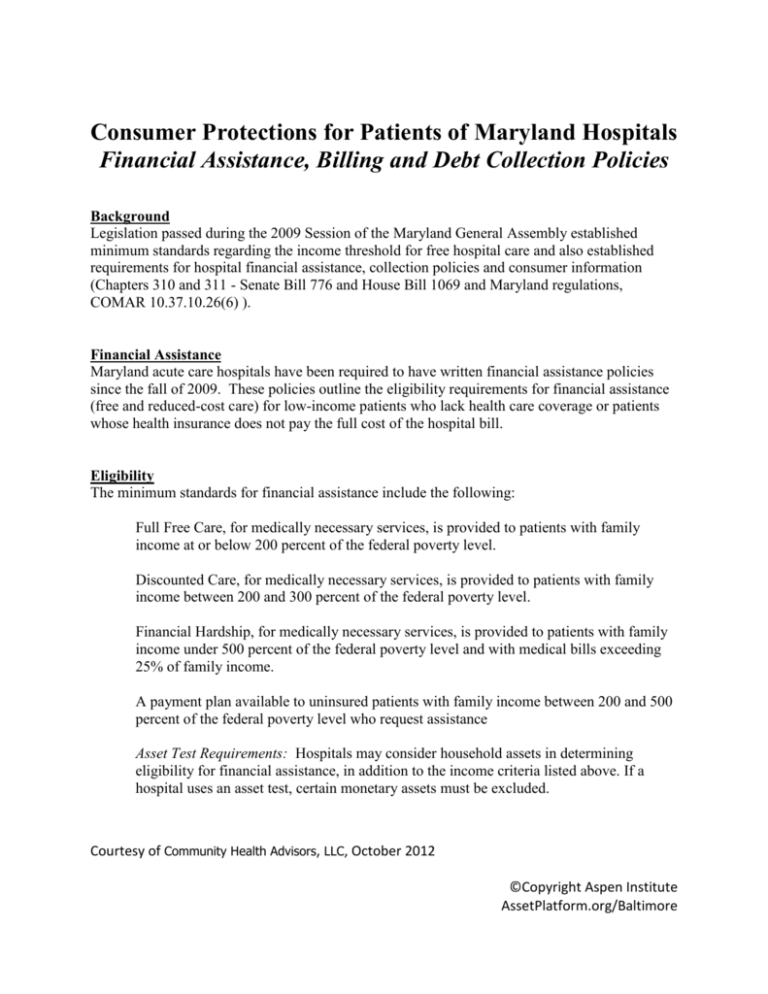
Consumer Protections for Patients of Maryland Hospitals Financial Assistance, Billing and Debt Collection Policies Background Legislation passed during the 2009 Session of the Maryland General Assembly established minimum standards regarding the income threshold for free hospital care and also established requirements for hospital financial assistance, collection policies and consumer information (Chapters 310 and 311 - Senate Bill 776 and House Bill 1069 and Maryland regulations, COMAR 10.37.10.26(6) ). Financial Assistance Maryland acute care hospitals have been required to have written financial assistance policies since the fall of 2009. These policies outline the eligibility requirements for financial assistance (free and reduced-cost care) for low-income patients who lack health care coverage or patients whose health insurance does not pay the full cost of the hospital bill. Eligibility The minimum standards for financial assistance include the following: Full Free Care, for medically necessary services, is provided to patients with family income at or below 200 percent of the federal poverty level. Discounted Care, for medically necessary services, is provided to patients with family income between 200 and 300 percent of the federal poverty level. Financial Hardship, for medically necessary services, is provided to patients with family income under 500 percent of the federal poverty level and with medical bills exceeding 25% of family income. A payment plan available to uninsured patients with family income between 200 and 500 percent of the federal poverty level who request assistance Asset Test Requirements: Hospitals may consider household assets in determining eligibility for financial assistance, in addition to the income criteria listed above. If a hospital uses an asset test, certain monetary assets must be excluded. Courtesy of Community Health Advisors, LLC, October 2012 ©Copyright Aspen Institute AssetPlatform.org/Baltimore Presumptive Eligibility Unless eligible for Maryland Medical Assistance or Children’s Health Programs, patients who are beneficiaries/recipients of the following programs are deemed eligible for free care, provided that the patient submits proof of enrollment within 30 days unless the patient or the patient’s representative requests an additional 30 days: Households with children in the free or reduced lunch program Supplemental Nutritional Assistance Program (SNAP) Low-income-household energy assistance program Primary Adult Care Program (PAC), until such time as inpatient benefits are added to the PAC benefit package Women, Infants and Children (WIC) Timeframe At a minimum, patients may apply for financial assistance within a two year period after receiving services. Hospital may reduce this two year period, to not less than 30 days after the date the hospital requests information from a patient or the guarantor of a patient, to determine the patient’s eligibility for financial assistance. In order to reduce the two year period, the hospital must document the lack of cooperation in providing the required information. Billing Effective October 2010, Maryland hospitals are required to provide patients with a bill for services upon discharge /dismissal or early during the regular billing period. Bills are to explain all care rendered and should represent the full charge for the patient's care. The bill must state that the charges are due within 60 days of discharge or dismissal and that the patient shall receive a 2-percent discount by paying upon discharge or a 1-percent discount by paying within 30 days. In addition, a notice shall be posted prominently at the billing office of the hospital clearly notifying all patients of the availability of financial assistance and the discounts mentioned above. Hospitals must provide a refund of amounts exceeding $25 collected from any patient, or the guarantor of a patient, who was found to be eligible for financial assistance within a 2-year period after the date of service. N.B. Physician charges, for hospital inpatient and outpatient services, are generally not included in the hospital bill. They are not covered under this law and are billed separately. Collection Hospitals are required to provide detailed procedures on the following collection actions. Reporting of patient debt to a consumer credit reporting agency. Courtesy of Community Health Advisors, LLC, October 2012 ©Copyright Aspen Institute AssetPlatform.org/Baltimore Commencing legal action regarding a patient debt. Wage garnishments applied to a patient’s or patient guarantor’s income. Placing a lien on a patient’s or patient guarantor’s personal residence or motor vehicle. Hospitals are prohibited from using the following collection actions; Charging interest on bills incurred by self-pay patients, prior to obtaining a court judgment. Reporting adverse information about a patient to a consumer reporting agency within 120 days after issuing an initial patient bill, unless the hospital documents the lack of cooperation of the patient or the guarantor of the patient in providing information needed to determine the patient’s obligation with regard to the hospital bill. Initiating and civil action against a patient for nonpayment within 120 days after issuing an initial patient bill, unless the hospital documents the lack of cooperation of the patient or the guarantor of the patient in providing information needed to determine the patient’s obligation with regard to the hospital Forcing the sale or foreclosure of a patient’s primary residence, if hospital holds a lien on a patient’s primary residence, to collect a debt owed on a hospital bill. Collection Remedies If the hospital has obtained a judgment against, or reported adverse information to a consumer reporting agency about, a patient later found eligible for financial assistance for the service related to the judgment or adverse information, the hospital is required to vacate the judgment or strike the adverse information. For Additional Information For more information on the financial assistance and billing/collection policies of Maryland hospitals, contact: The Maryland Health Services Cost Review Commission (HSCRC). They can be reached at this toll free number 1-888-287-3229, or visit their website at http://76.12.205.105/consumers_uniform.cfm In an effort to standardize financial assistance requests across all Maryland hospitals, HSCRC has developed a standard financial assistance application. This application can be completed by patients and sent to the individual hospital where s/he has an outstanding balance. The HSCRC has also developed a frequently asked question sheet that can also be accessed on their website. Courtesy of Community Health Advisors, LLC, October 2012 ©Copyright Aspen Institute AssetPlatform.org/Baltimore
